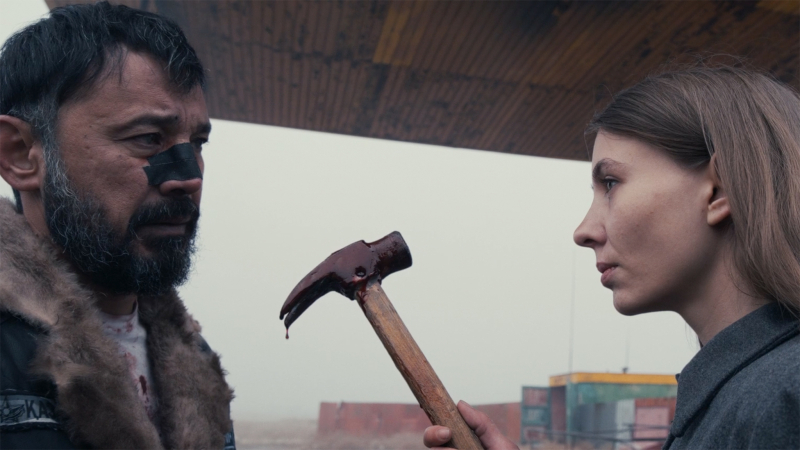
International Film Festival Rotterdam
MOVIE REVIEW
Steppenwolf (2024)
"Steppenwolf" starts and ends with recreations of the doorway shots from "The Searchers," which is wearing your Western heart on your sleeve; it also reverses one of them to say something different than John Ford had in mind. In between, writer-director Adilkhan Yerzhanov lays other Western homages on thick, and adds some samurai tones via Quentin Tarantino. But the presiding spirit in "Steppenwolf" is Sergio Leone, whose high-drama low-dialogue tactics Mr. Yerzhanov embraces like a favorite uncle. The film is set in some stylized form of the modern era, with truck convoys and armored cars and militarized police stations; but inside them the scowling taciturn men of Kazakhstan show unrefined Spaghetti Western cynicism about anything other than their own self-interest and whale into each other with claw hammers.
The only female character, standing in for half the population, is Tamara (Anna Starchenko), a mother searching for her lost son during some chaotic time of Kazakh national crisis or civil war. Traumatized into near-incoherence and abused beyond limits at home, Tamara is the innocent and the holy fool, stumbling through gun battles and firefights and carnage without apparently noticing, emerging unscathed. Wandering into the aftermath of the latest factional slaughter, she is spotted by Brayuk (Berik Aitzhanov), a part-time torturer and habitual psychopath about to be executed by the winning side. Ever the opportunist, Brayuk blithely claims that Tamara has a stash of cash that he will happily locate if they just let him go. Brayuk turns out to have his own trauma, losing his family to murderous bandits and child traffickers. He and Tamara set off together, notionally in search of a resolution for her; but the opportunity of resolution for him will soon arise.
Exactly what national calamity is underway stays unclear, and isn't the point. There's talk of terrorism, with violence from the state being meted out in response. Or it could be a global meltdown, this bit of Kazakhstan covered in rubble and on fire standing in for a broader collapse going on over the horizon, like the countryside did in the first "Mad Max." Either way the world is broken and the men are feral, two things not unconnected. Mr. Aitzhanov starts off looking a bit like Eric Bana after a year in a fallout shelter, before settling into a groove of stoic violence and obtuse muttering plus a bit of ungainly dad dancing – the dance of the mad – and becoming more like Rod Steiger in Mr. Leone's "Duck, You Sucker!". Brayuk arrives at his final form after acquiring a small tinkling silver bell and attaching it to the end of his gun barrel, so that it announces his presence like Charles Bronson's harmonica in "Once Upon a Time in the West"; if Mr. Yerzhanov hadn't already given subtlety a wide berth, then this would clinch it. This garish, violent and nasty myth-making suits the 2020s as well as it suited the 1960s, as we rush back to the future with optimism curdling and the world on fire. Murdering his way across Kazakhstan in pursuit of a monster worse than he is, Brayuk is one of cinema's past angels of death still gainfully employed in the present, as blasted as the rocks he walks on and emptied out inside. He's a name with no man.
Comments